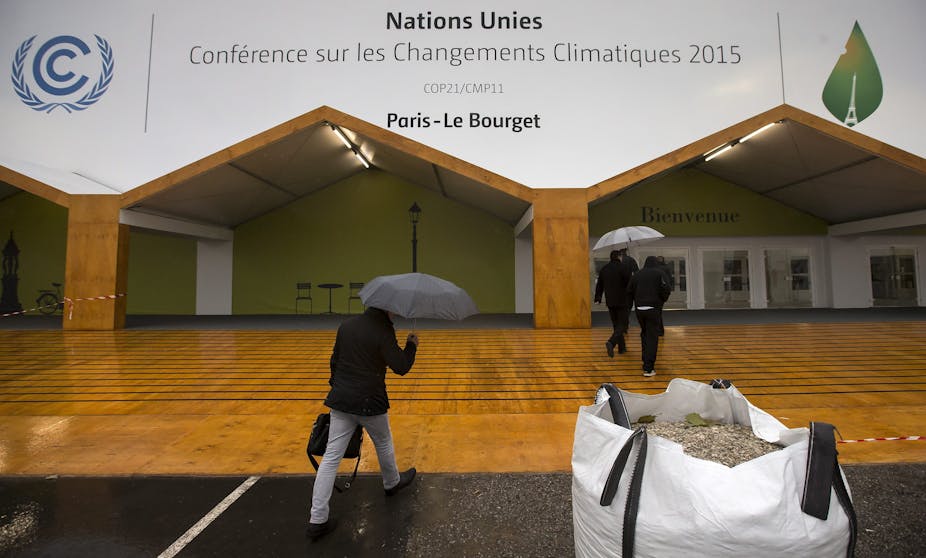With so much build-up to the United Nations Framework Convention on Climate Change (COP21) in Paris, the pressure not to fail is as great as it has ever been. This conference of parties (COP) follows the Kyoto Protocol in achieving agreements that are binding for the 190 countries represented. As it comes at a time that is dire for our climate future, an urgent and momentous outcome is needed.
As of Monday there will be more than 40,000 delegates at the conference. I will be reporting from the conference venue in Le Bourget), just to the northeast of Paris.
The media interest in this summit is greater than it has ever been. Six-thousands journalists applied to go; only 3000 places are available. What such interest signifies is the sense that Paris will provide a collective recognition that we are drawing so close to losing control over the climate.
The conference will not by itself create the change that is needed to address climate change, except in one respect: it rallies every nation to get on board in what has to be a collective effort. The question here is: how sincere will each nation be in keeping their promises?
The two degree guardrail is advanced as a measure of the fact that anything more and humans lose control over being able to do anything about climate change. But for more radical climate assessments, to aim for a guardrail that is so close to UN-defined consensus limits is high risk – especially when considering that the pledges that have been made by participating nations around the world are pointing toward 2.7°C.
And, as had transpired, the importance of the conference has not been held hostage to the terrorist events of mid-November. Instead some have sought to point out that the climate summit that millions will march for this weekend is also a peace summit.
There is, after all, no way that humans are going to peacefully co-exist when dealing with so many new forms of existential threats, extreme weather, climate migration, food shortages – all of which become destabilising threat multipliers for military conflict also.
According to this thesis, a circle was actually closed by the terror attacks of November 13. That is, climate-induced drought in Syria led to civil war, which has led to a power vacuum, providing a base for Islamic State to conduct training for international terrorism, such as was witnessed in Paris.
Paris will be different from Copenhagen in at least three respects.
First, all of the nations represented at the conference have been asked to submit “Intended Nationally Determined Contributions” in advance. So far 167 of the participating nations have done this, so there is already a baseline commitment to work with, and a way of evaluating the collective impact of such pledges as a basis for negotiation.
Second, there is the fact that since Copenhagen, climate change has been mainstreamed. As Erwin Jackson from the Climate Insitute has put it:
Climate change is not just an issue that is discussed in environment ministries any more, its now being discussed in treasuries. It is being discussed in defence departments.
Third, there is the enormous renewables boom since Copenhagen. The Climate Council in Australia has just launched its latest report:
A Whole New World: Tracking the renewables boom from Copenhagen to Paris
The report details how, since Copenhagen, the number of nations locking into renewable energy targets has doubled. Nearly five million new jobs worldwide have been created since that time. The cost of solar power modules has fallen 75% in that time and wind power dipped by 30%.
This all adds up to countries being able to back their pledges because an alternative to fossil fuel in now available. And around the world, US$270 billion in renewable investments were made just last year, according to a UN report.
Such investment lags behind annual investment in fossil-fuel energy industries, but the difference is that such investment is in year-on-year decline. An open letter will be published today in New Scientist and The Guardian, signed by world-leading economists and scientists who have called for a moratorium on the building of new coal mines.
At the same time, the fossil fuel industry has a toe-hold on the Paris conference itself. GDF Suez (now Engie), the co-owner of Victoria’s Hazelwood coal mine, one of Australia’s dirtiest coal mines, is one of the event’s fossil fuel “sponsors”.
I will be interested to learn, while at the conference, precisely what such companies gain from being sponsors, in an age where greenwash can dramatically mask the sincerity of the promises that nations are about to make to change the world.

